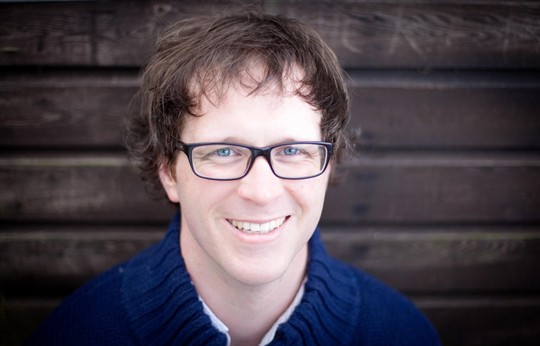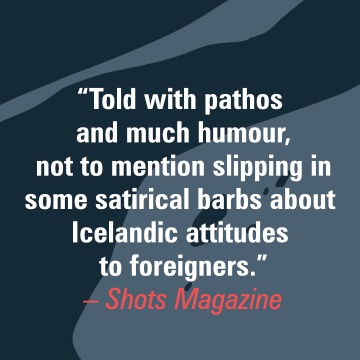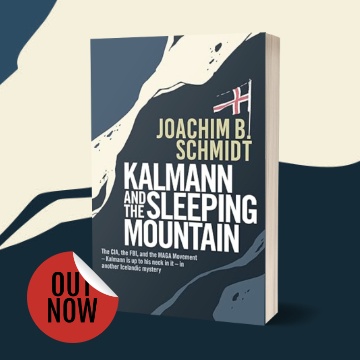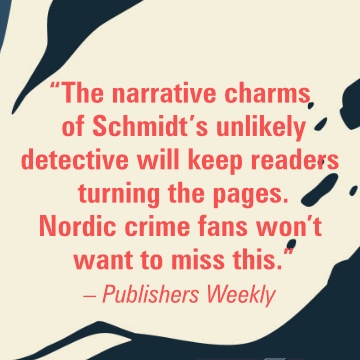

He may have only won a mug, but debut author Simon Sylvester was delighted to pick up The Guardian’s Not The Booker Prize last month. The Scots-born, Cumbria-based writer and film maker took the honours with the haunting and enthralling The Visitors. Set on a fictional Scottish isle, it features believable teenage characters, some Celtic mythology, and a mystery centred around a body that washes up on the shore. It got five stars when it was reviewed here in the summer and we added it to our Recommended list to the right. Let’s find out how this debut author did it…
After writing so many short stories, was it a challenge to create your first novel?
Novels are huge. The challenge is to take everything that works in a good short piece – something that packs a punch, something lean – and maintain it across a story that’s 50 times as long. Novels can afford the space to explore ideas and places in more depth, but that depth has to be cohesive in emotion, narrative and atmosphere. I prefer working in novels. I like the immersion of another world.
What inspired you to write The Visitors?
The landscape of the west coast of Scotland. I was on holiday in Kintyre with my wife and baby daughter, who kept waking ridiculously early. One morning we watched the sun rise above Arran, the Kilbrannan Sound like a single piece of glass. I had an overwhelming sense of all the life that boiled beneath the surface. I imagined being a teenager in the same cottage we were staying in, remote and alone, but with the glow of Glasgow in the sky at night, looking for any escape she could find. I filled an A4 pad with notes, and it all came from there.
Your teenagers characters are so well drawn – how did you get inside the heads of Flora and Ailsa?
Thanks! I don’t really have an answer for this, though. I didn’t try to use them as ventriloquist dummies, I just wanted to write about people. The same instincts run through us all, whether you’re a Scottish teenager, a Sardinian grandmother or a Siberian toddler. My little girl is three, now. I see the same frustration when she struggles with her cardigan buttons that I feel when a story isn’t flowing. I try to tap those sensations when I’m writing a fictional character.
Bancree is fictional but doesn’t feel it. Did you base it on places you know?
Absolutely. None of the islands I know did quite what I needed, so Bancree became a jigsaw of the landscapes I love – the Cromarty coast and the Hebrides, Torridon and Culloden. I grew up seeing Ben Wyvis from my bedroom window, and spent big chunks of my teens and 20s zipping around Scotland. It’s the most beautiful country. When I finished the first draft of The Visitors, we took a trip to Islay. I wanted to drown myself in the smells and sounds of the west coast. I redrafted with all those sensations still singing in my head.
The mythical selkies are an important part of this story – how easy is it to research a mythical creature?
The core story – the one John tells Flora – is very common. I can’t remember not knowing it, in the same way I can’t remember not knowing Hansel and Gretel. It doesn’t take a lot of looking to find dozens of interpretations across different cultures. I’m fascinated by the way stories can travel through people, transforming as they go. We all carry a little ember of that campfire story inside ourselves. It just needs a little oxygen to fire up again. People are hardwired for stories.
Do you plan your writing day or prefer to see where the muse takes you?
A little of both. I’ve tried writing to strict plans, and I’ve tried writing into pure blank space, and neither really works for me. I’ve settled on something in between, where I have a loose skeleton of a plan, and a sense of where I want it to go, but the story still has space to breathe, to move, to evolve. And they do evolve. They mutate, they find their own momentum. When I tried using rigid plans, I found I was strangling my stories with structure. Now I don’t plan my last third at all, because there’s seldom any point. After a while, the characters decide how it’s going to end. The most exciting stage is when I hit that tipping point, and it starts to accelerate away from me – that’s when I’m along for the ride.
The book has been incredibly well received – does that put the pressure on for your next novel?
I’ve been very lucky, and people have been very kind. It’s humbling, but I don’t really feel any pressure because of that. For me, all the pressure comes from time. I teach video production in a college, and I make films for local businesses too. Finding the time to write around those jobs is my biggest and constant challenge. I pressure myself to write better, write faster, and I get frustrated when it doesn’t flow.
What’s next for you?
My second novel is called The Hollows. It’s another mystery – about an old man losing his memories, and his daughter setting out to find them. It’s set in a giant bog, which is great fun to write. I’m about a quarter of the way into my first draft, and starting to find my way. I’m also quietly brewing on the novels I’d like to write after that. I have plans for a road trip in a polluted mountain range and a whodunnit in an Ullapool old folks’ home. I have ideas fizzing for the projects after that, too: ghosts, graffiti, spice.
Read our review of The Visitors here.









